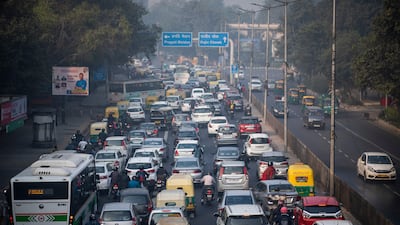A bus driver in India has received a 190-year jail sentence – 10 years for each of the 19 passengers who were burnt alive in a May 2015 road accident.
Mohammad Shamshuddin, 47, was convicted by a court in the Panna district of India's central Madhya Pradesh state on Friday.
prosecutor
Shamshuddin was driving a bus carrying 65 passengers when it fell off a bridge and plunged into a dry canal below.
The bus immediately caught fire, killing 19 passengers and injuring more than a dozen people.
In pictures: India's road safety crisis
During the investigation, it was found that Shamshuddin was driving recklessly and the vehicle's emergency exits had been illegally modified. The emergency exit was blocked with iron rods and an extra seat had been mounted, trapping people on the burning bus.
Some victims were so badly burnt that their bodies were beyond recognition.
Judge RP Sonkar said Shamshuddin was guilty of manslaughter. The prosecution claimed that Shamshuddin's punishment was not just exceptional but the first of its kind in a country where road deaths are high but convictions are rare, hovering at between 5 to 10 per cent.
Indian courts generally avoid sentencing people on separate counts; jail terms are handed down concurrently.
“The postmortem and DNA confirmed 19 bodies and so the 19 deaths were counted. The driver has been convicted for 190 years, 10 years each for the killings. We are relieved with the judgment,” public prosecutor Jitendra Singh Bains told The National.
“The owner was also convicted of negligence and murder, for 10 years. He had sealed the exit gate with a rod and passengers could not escape because of that,” Mr Bains said.
Road safety in focus
The owner of the bus, Gyandendra Pandey, was also tried on charges of culpable homicide and death owing to negligence under India's Motor Vehicle Act. He has been sentenced to 10 years' hard labour.
But Mr Pandey’s lawyer, JK Rao, described the ruling as “third class” and said it would be challenged in a higher court.
“Both of them have been convicted. The punishment is consecutive for the driver but this is a third-class judgment,” Mr Rao told The National.
“We have already filed an appeal at the high court … they argued that the killings were without intention but with the knowledge," he said, referring to the accusation that the bus driver knew the vehicle was unsafe.
"But there is no evidence to prove that," Mr Rao said. "My clients had no mala fide intentions to commit manslaughter."
India has some of the deadliest roads in the world.
Each year tens of thousands of people die in accidents owing to negligence, faulty road design, lax safety laws and corruption. Road crashes are one of the biggest causes of unnatural death in the country.
At least 133,715 people were killed in road accidents in 2020, according to the latest figures released by the National Crimes Records Bureau.
About 79,000 accidents were blamed on negligent driving, but overall conviction rates are low.







